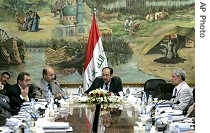2007年VOA标准英语-Iraqi Politically Squabbling Hinders Progress,(在线收听)
Irbil
07 July 2007
This past week, Iraq's parliament was supposed to begin debating the law seen as its most vital: how the country's most important resource, oil, will be shared among Shi'ites, Sunnis and Kurds. But as VOA's Margaret Besheer reports from Iraq, the debate has stalled as other political crises distract the government.
 |
| Iraqi Prime Minister Nouri al-Maliki, center, presides over cabinet meeting in Baghdad, 03 Jul 2007 |
Prime Minister Nouri al-Maliki took office in May 2006, promising to make national reconciliation a top priority. A year later, there has been no reconciliation; the government remains deadlocked on a number of issues; members of political blocs are boycotting the parliament and cabinet; and several important legislative matters have not been finalized.
On Tuesday, Iraq's cabinet approved an amended draft oil and gas law, which the United States considers key to helping unite the country's warring communities. The bill was first approved in February, but several influential factions expressed reservations about it, prompting further debate. That discussion was set for Wednesday in parliament, but the deputies discussed everything else but it.
Meanwhile, the week brought new political crises.
On Tuesday the Tawafuq Front, a coalition of Sunni parties, announced its six ministers would boycott cabinet sessions until the government creates an independent committee to investigate charges against Sunni Culture Minister Asad Kamal al-Hashimi.
Hashimi is charged with masterminding an assassination attempt two years ago on another Sunni politician. The politician survived the attack, but two of his sons were killed.
Deputy parliament speaker Khalid al-Atiyah called on the Tawafuq Front to end its boycott, saying it was not helpful, and that the bloc should express their opinions inside parliament and not hold up the work of the legislature.
The Tawafuq Front is the second bloc to boycott the government. In April, six ministers loyal to Shi'ite cleric Moqtada al-Sadr quit the cabinet to protest the government's unwillingness to call for a timetable for the withdrawal of U.S. troops.
And in the latest political development, Prime Minister Maliki is charging that criminal elements, including people linked to former ruler Saddam Hussein, have infiltrated Sadr's movement.
"These are people who have joined the Sadrist movement to use it as a cover and they are Saddamists, Baathists and criminal gangs. They are taking advantage of the [Sadr] name," he said.
He called on the leaders of the Sadrist Movement to make "decisive and clear decisions so that they do not bear responsibility for those who use their name for killings and acts of terrorism."
Mr. Maliki owes a great deal of his political support to Sadr, and his comments Saturday were uncharacteristically harsh.
Meanwhile, as the political situation remains stalemated, the violence continues.
In a spectacular attack, Iraqi police say a truck bomb exploded Saturday, killing more than 100 people and wounding scores more in a market in the northern village of Amrli, near Tuz Khurmatu.
Amrli is a small rural community of people from Iraq's Shiite Turkmen minority about 165 kilometers north of Baghdad.
That attack follows one late Friday in a tiny Shiite Kurdish town near the Iranian border. A suicide car bomber struck outside a cafe there killing more than 20 people.
Also Saturday, the U.S. military announced the deaths of eight more American troops and an Iraqi interpreter, killed in combat operations since Thursday. And British military officials say two British soldiers have been killed in operations in Basra since Friday.